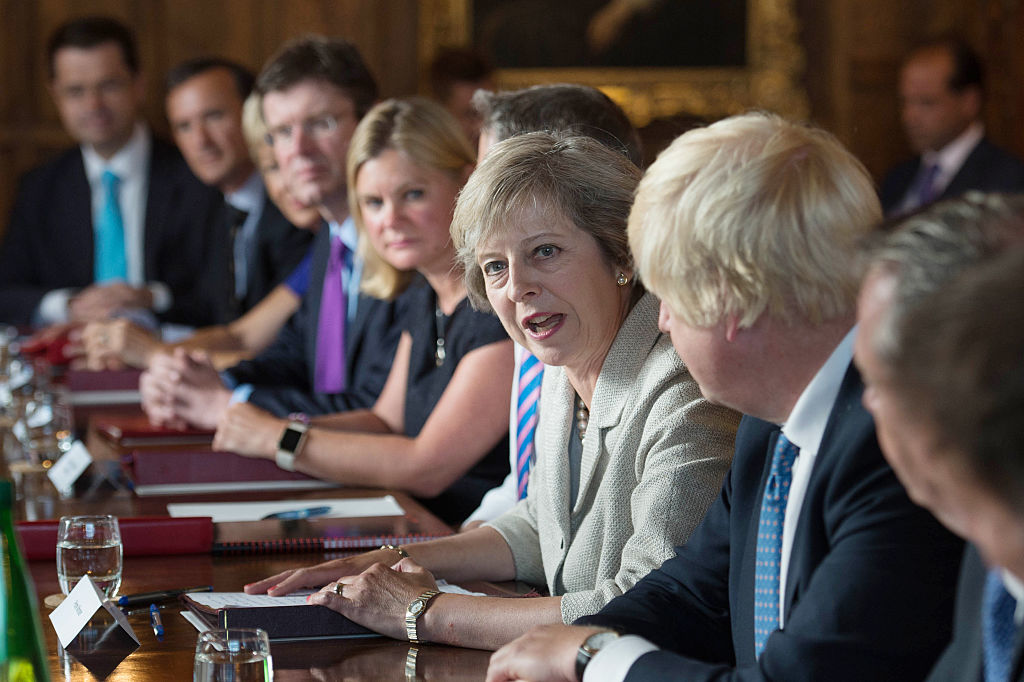Theresa May and her Cabinet are meeting at Chequers today to try and finally thrash out an agreement on what kind of Brexit the Tories want. Six hundred days have now passed since the referendum vote, and ministerial discussions on Brexit have so far failed to deliver any ‘white smoke’ moments, says the Daily Telegraph. The problem for the Government until now, says the paper, is that the clear aims Theresa May set out in her Lancaster House speech were ‘bisected’ by a general election which undermined her statement of intent. We were promised a ‘tough negotiation’; but in the wake of the Tories’ lost majority, Brexit talks have, instead, ‘turned into something resembling a capitulation’. In the first round of discussions, Britain ‘gave the EU side much of what it wanted’ – on the Brexit divorce bill, Ireland and the rights of EU citizens. It is time to finally put up a fight, suggests the Telegraph, which argues that the £39bn Britain has agreed to pay the EU is a ‘powerful bargaining counter and should be used against the EU’. Yet the Government appears to be continuing its policy of capitulating: a leaked document indicates that Britain could be willing to allow a longer transition period than the two years which May had set out in her Florence speech. This has made Tory Brexiteers understandably ‘nervous’, says the paper, and it is vital that minsters listen to their worries. A ‘specific date’ must be set, and May must also ‘clarify how the aim of keeping the UK close to Europe does not compromise the whole point of leaving’. This means that the Chequers meeting needs to result in a ‘clear message’. It is vital that the ‘ambiguity and uncertainty’ that is ‘allowing the Labour Party to get away unchallenged over the contradictions in its own policy’ – and also troubling those on the Tory backbenches – comes to an end, concludes the Telegraph.
The Times also voices concerns about an indefinite transition period. ‘The danger is that the process could drag on indefinitely,’ says the paper in its editorial. This means it is all too vital that the Government makes sure the transition has a firm deadline. Of course, ministers are right to indicate that this deadline does not have to be December 31, 2021. But whatever the date, a date is still needed. After all, both Brexiteers and EU leaders ‘are…keen to get Brexit over and done with’. A longer transition period would also ‘cause problems for the Government’, points out the Times, which says that delaying a definite exit from the EU would mean Britain is ‘entangled with Brussels as the EU enters its next round of budget spending’. If things drag on beyond 2022, it would also mean fighting another election with Brexit still very much an unsettled matter. It is, then, a ‘sensible aspiration’ for Tory MPs to want to limit the transition period. But the paper sounds a note of caution in its conclusion: ‘If the Tories do impose a timetable they cannot keep…they are sure to be punished at the polls.’.
‘An open-ended transition period’ is one way to ‘ensure we are still shackled to the EU in 20 years’ time’, says the Sun. The paper says an indefinite transition is a ‘mad idea’, and suggests that it must have been ‘dreamed up by the same Europhile civil servants’ desperate to block Brexit altogether. Whatever some say, a deadline ‘is essential to focus every single mind on Brexit’s inevitability’. It is true that Brexit supporters ‘will not get everything they want’, and the need to make compromises is now widely accepted, the paper concedes. But on the issue of a transition period deadline, ministers must stand firm. It will be a ‘historic error’ not to do so, concludes the Sun.







Comments